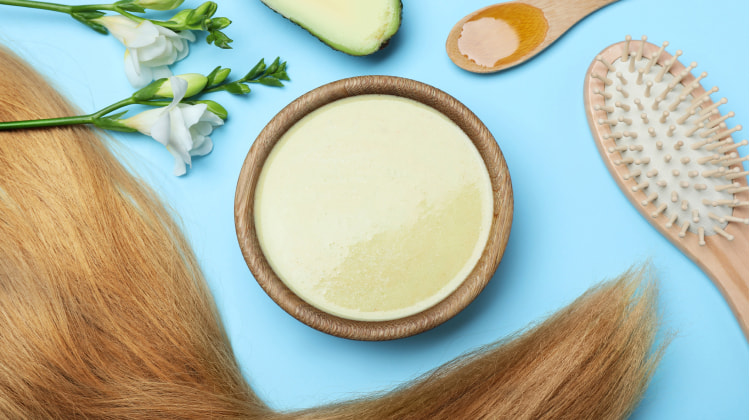
Are you looking to give your hair a boost with a homemade protein treatment? You've come to the right place. We've compiled a list of 9 DIY protein-rich hair masks for all hair types, from curly to bleached, high porosity to low porosity, and even vegan options. So, let's dive right in and get those locks looking luscious!
9 DIY Protein-Rich Hair Masks for Healthy Hair
Egg and Yogurt Hair Mask
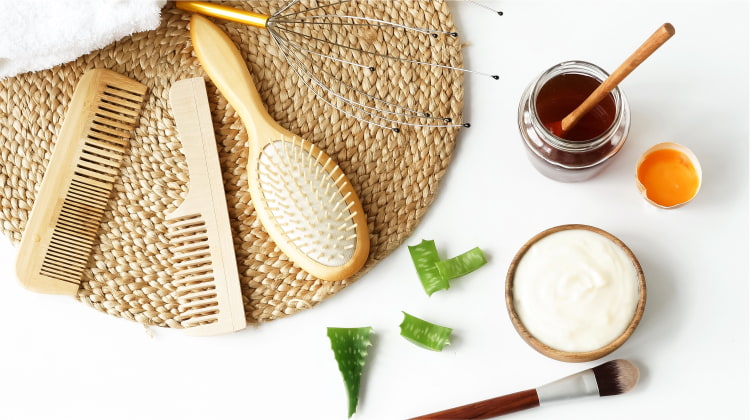
Prep Time: 5 minutes
Ingredients:
- 1 egg
- 2 tablespoons yogurt
Instructions:
- Crack the egg into a bowl and whisk until the yolk and egg white are well combined.
- Add the yogurt to the bowl, and mix well until a smooth consistency is achieved.
- Apply the mixture to damp hair, making sure to cover from roots to tips.
- Put on a shower cap and let the mask sit for 30-45 minutes.
- Rinse your hair thoroughly with lukewarm water, followed by a gentle shampoo and conditioner.
Warnings:
- If you're allergic to eggs or yogurt, avoid using this mask.
- Use only plain, unflavored yogurt for the best results.
Benefits:
Egg and yogurt mask is a fantastic protein treatment for natural hair. The egg provides proteins that help strengthen your hair, while yogurt offers lactic acid, which can help to cleanse the scalp and promote hair growth(1). This mask also moisturizes and adds shine to your hair, leaving it looking and feeling silky smooth.
Avocado and Banana Hair Mask
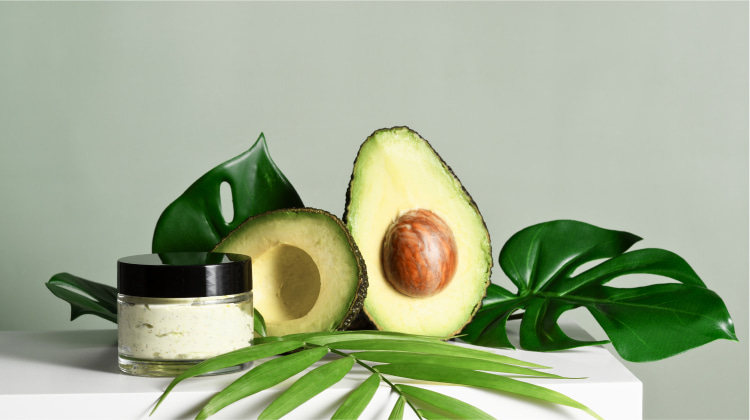
Prep Time: 10 minutes
Ingredients:
- 1 ripe avocado
- 1 ripe banana
Instructions:
- Peel and pit the avocado, then scoop out the flesh into a mixing bowl.
- Peel the banana and add it to the mixing bowl with the avocado.
- Mash the avocado and banana together until a smooth paste is formed. You can also use a blender for an even smoother consistency.
- Apply the mixture to damp hair, covering from roots to tips.
- Put on a shower cap and let the mask sit for 30-45 minutes.
- Rinse your hair thoroughly with lukewarm water, followed by a gentle shampoo and conditioner.
Warnings:
- Avoid using this mask if you have an allergy to avocados or bananas.
- Make sure to use ripe fruits for easier mashing and better absorption of nutrients.
Benefits:
Avocado and banana hair mask is perfect for natural 4C hair or anyone with dry, damaged hair. Avocado is rich in proteins, healthy fats, vitamins, and minerals(2) that help nourish and strengthen hair.
Banana contains potassium, natural oils, and vitamins that can improve hair elasticity and reduce breakage. This hair mask not only provides a protein boost but also hydrates and softens the hair, giving it a healthy shine.
Mayonnaise and Honey Hair Mask
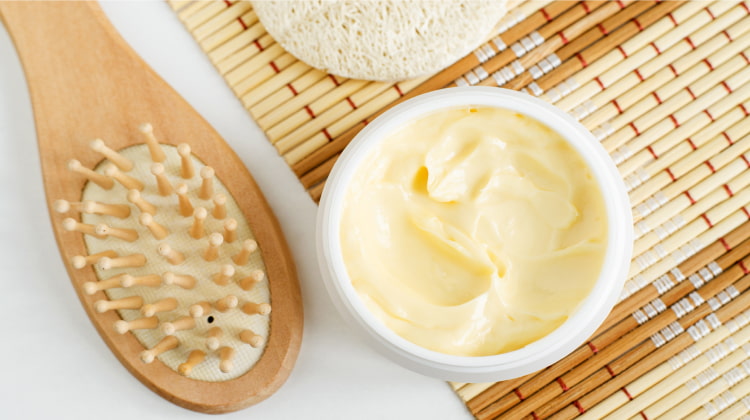
Prep Time: 5 minutes
Ingredients:
- 2 tablespoons mayonnaise
- 1 tablespoon honey
Instructions:
- In a mixing bowl, combine the mayonnaise and honey until smooth and well blended.
- Apply the mixture to damp hair, ensuring coverage from roots to tips.
- Put on a shower cap and let the mask sit for 30-45 minutes.
- Rinse your hair thoroughly with lukewarm water, followed by a gentle shampoo and conditioner.
Warnings:
- If you're allergic to eggs (mayonnaise contains eggs) or honey, avoid using this mask.
- Make sure to use real mayonnaise, not salad dressing or other substitutes, for the best results.
Benefits:
Mayonnaise and honey hair mask is ideal for curly hair, as it offers a powerful combination of nourishing and moisturizing ingredients. Mayonnaise is rich in proteins, oils, and fatty acids that help strengthen and repair hair, while honey is a natural humectant that attracts and retains moisture(3), adding shine and smoothness to your locks.
This protein hair mask can help tame frizz, reduce breakage, and improve manageability, leaving your curls looking fabulous.
Coconut Milk and Olive Oil Hair Mask
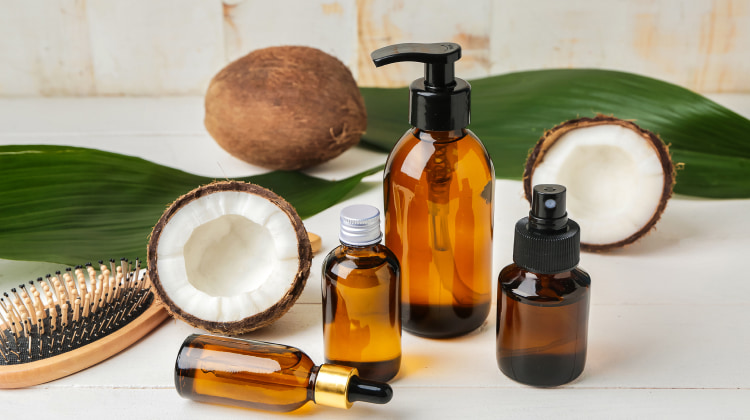
Prep Time: 5 minutes
Ingredients:
- 1/4 cup coconut milk
- 1 tablespoon olive oil
Instructions:
- In a mixing bowl, combine the coconut milk and olive oil until well blended.
- Apply the mixture to damp hair, making sure to cover from roots to tips.
- Put on a shower cap and let the mask sit for 30-45 minutes.
- Rinse your hair thoroughly with lukewarm water, followed by a gentle shampoo and conditioner.
Warnings:
- If you have an allergy to coconut milk or olive oil, avoid using this mask.
- Use only pure, unsweetened coconut milk and extra virgin olive oil for the best results.
Benefits:
Coconut milk and olive oil hair mask is a fantastic DIY protein hair mask for high porosity hair. Coconut milk is packed with proteins, fatty acids, and vitamins that help nourish and strengthen the hair, while olive oil is rich in antioxidants and healthy fats(4) that moisturize and condition.
This hair mask not only provides a protein boost but also helps to seal in moisture, leaving your hair soft, shiny, and more manageable.
Gelatin and Apple Cider Vinegar Hair Mask
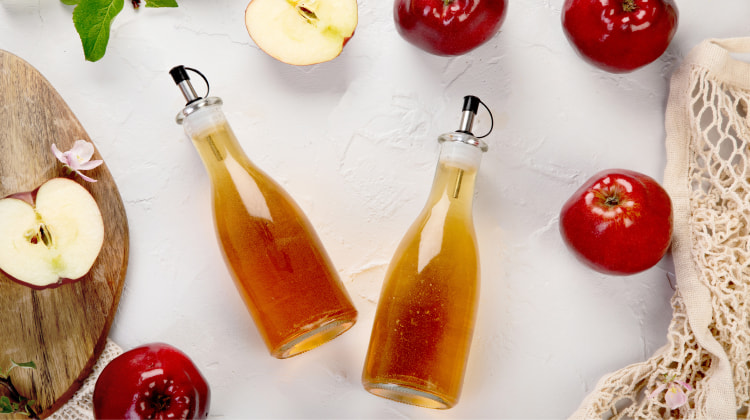
Prep Time: 10 minutes
Ingredients:
- 1 tablespoon unflavored gelatin
- 1/4 cup warm water
- 1 teaspoon apple cider vinegar
Instructions:
- Dissolve the unflavored gelatin in warm water, stirring until completely dissolved.
- Add the apple cider vinegar to the gelatin mixture and stir well.
- Apply the mixture to damp hair, covering from roots to tips.
- Put on a shower cap and let the mask sit for 15-20 minutes.
- Rinse your hair thoroughly with lukewarm water, followed by a gentle shampoo and conditioner.
- Warnings:
- Avoid using this mask if you have an allergy to gelatin.
- Ensure you use unflavored gelatin and raw, unfiltered apple cider vinegar for optimal results.
Benefits:
Gelatin and apple cider vinegar hair mask is a highly effective protein treatment for natural hair, especially for those with low porosity hair. Gelatin, derived from animal collagen, contains proteins that can penetrate hair strands, helping to fortify and strengthen them(5).
Apple cider vinegar, on the other hand, has the ability to balance the pH levels of your hair and scalp, promoting overall hair health. This mask can enhance your hair's elasticity, reduce breakage, and restore shine, leaving your hair revitalized and rejuvenated.
Fenugreek and Coconut Oil Hair Mask
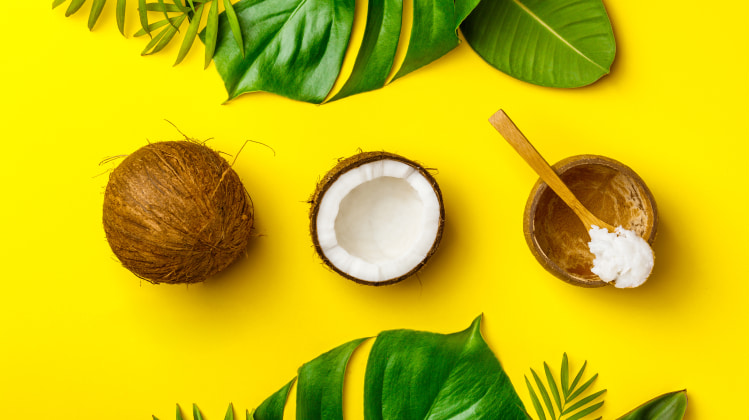
Prep Time: 8 hours (for soaking fenugreek seeds) + 10 minutes
Ingredients:
- 2 tablespoons fenugreek seeds (soaked overnight)
- 1 tablespoon coconut oil
Instructions:
- Immerse the fenugreek seeds in water and let them sit overnight. The next day, drain the water and grind the seeds into a fine paste using a blender or mortar and pestle.
- Blend the fenugreek seed paste and coconut oil in a mixing bowl until thoroughly combined.
- Apply the mixture to damp hair, covering from roots to tips.
- Put on a shower cap and let the mask sit for 30-45 minutes.
- Rinse your hair thoroughly with lukewarm water, followed by a gentle shampoo and conditioner.
Warnings:
- If you have an allergy to fenugreek or coconut oil, avoid using this mask.
- Make sure to use pure, unrefined coconut oil for the best results.
Benefits:
Fenugreek and coconut oil hair mask is a powerful DIY protein hair mask for natural hair types. Fenugreek seeds are rich in proteins, vitamins, and minerals that help to nourish and strengthen hair, while also promoting hair growth.
Coconut oil(6), with its moisturizing properties and fatty acids, adds shine and softness to your locks. This mask can help combat hair loss, improve hair thickness, and even soothe an itchy scalp.
Aloe Vera and Rice Water Hair Mask
Prep Time: 30 minutes (for soaking rice) + 10 minutes
Ingredients:
- 1/4 cup uncooked rice
- 1 cup water
- 2 tablespoons aloe vera gel
Instructions:
- Rinse the uncooked rice to remove any debris or impurities. Place the rice in a bowl and cover it with water. Let it sit for half an hour.
- After 30 minutes, strain the rice and collect the rice water in a separate container.
- In a mixing bowl, combine the rice water and aloe vera gel until well mixed.
- Spread the mixture onto damp hair, ensuring coverage from the roots to the ends.
- Put on a shower cap and let the mask sit for 30-45 minutes.
- Rinse your hair thoroughly with lukewarm water, followed by a gentle shampoo and conditioner.
Warnings:
- If you have an allergy to aloe vera, avoid using this mask.
Benefits:
Rice water and aloe vera hair mask is an excellent DIY protein hair mask for damaged hair. Rice water(7) is rich in proteins, vitamins, and minerals that can help repair and strengthen hair, while also promoting hair growth.
Aloe vera(8) is known for its soothing and moisturizing properties, making it ideal for nourishing damaged hair. This mask can help improve hair elasticity, reduce breakage, and restore shine to dull, lifeless hair.
Oatmeal and Almond Milk Hair Mask
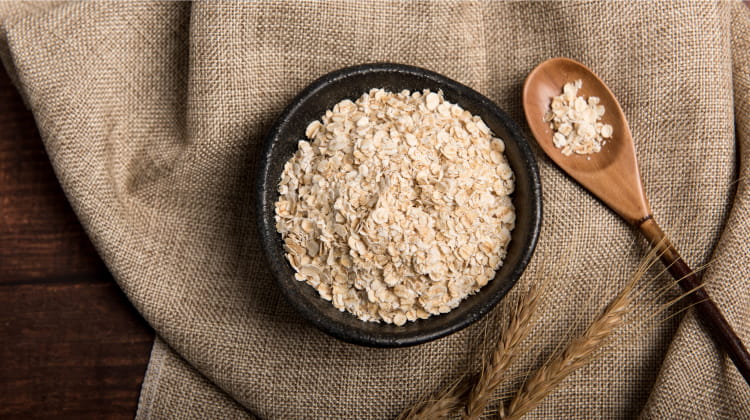
Prep Time: 5 minutes
Ingredients:
- 1/4 cup oatmeal (finely ground)
- 1/4 cup almond milk
Instructions:
- Mix the ingredients in a mixing bowl to form a smooth paste.
- Apply the mixture to damp hair, covering from roots to tips.
- Put on a shower cap and let the mask sit for 30-45 minutes.
- Rinse your hair thoroughly with lukewarm water, followed by a gentle shampoo and conditioner.
Warnings:
- If you have an allergy to almonds, avoid using this mask.
- Make sure to use pure, unsweetened almond milk for the best results.
Benefits:
Oatmeal and almond milk hair mask is a fantastic DIY protein hair mask for bleached hair. Oatmeal(9) is packed with proteins and minerals that can help repair and strengthen damaged hair, while almond milk(10) contains proteins, vitamins, and healthy fats that nourish and hydrate the hair.
This mask can help soothe an irritated scalp, reduce breakage, and add shine to dull, damaged hair.
Quinoa and Argan Oil Hair Mask
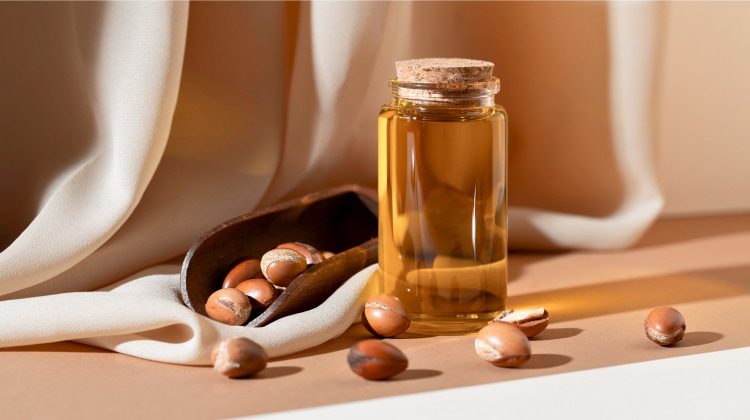
Prep Time: 5 minutes
Ingredients:
- 1/4 cup cooked quinoa
- 1 tablespoon argan oil
Instructions:
- In a mixing bowl, mash the cooked quinoa until a smooth paste is formed.
- Add the argan oil to the mashed quinoa and mix well.
- Apply the mixture to damp hair, covering from roots to tips.
- Put on a shower cap and let the mask sit for 30-45 minutes.
- Rinse your hair thoroughly with lukewarm water, followed by a gentle shampoo and conditioner.
Warnings:
- If you have an allergy to quinoa or argan oil, avoid using this mask.
Benefits:
Quinoa and argan oil hair mask is a remarkable DIY vegan protein hair mask. Quinoa contains high-quality plant-based protein, amino acids, and minerals that help strengthen and repair hair.
Argan oil(11), known as "liquid gold," is packed with antioxidants, vitamins, and fatty acids that nourish and moisturize the hair. This mask can help improve hair elasticity, reduce breakage, and restore shine to lackluster locks.
Final Thought
There you have it, 9 DIY protein-rich hair masks for healthy hair, catering to a variety of hair types and needs. So, why not give one (or more) of these recipes a try? Your hair will thank you! Remember, consistency is key, so make sure to incorporate these protein treatments into your hair care routine to keep reaping the benefits.
Frequently Asked Questions
How do I know if my hair needs protein?
Your hair needs protein if it's weak, brittle, excessively stretchy, or breaks easily. A simple strand test—gently stretching a wet hair strand—can reveal if your hair lacks protein. If it snaps quickly or stretches a lot before breaking, it needs protein.
How do you make a protein mask for your hair?
To make a protein hair mask, combine protein-rich natural ingredients like eggs, yogurt, or avocado with moisturizing agents like honey or olive oil. Apply the mixture to damp hair, cover with a shower cap, and let it sit for 30-45 minutes. Rinse and follow with shampoo and conditioner.
What natural protein can I put in my hair?
Eggs, yogurt, avocado, mayonnaise, gelatin, fenugreek seeds, rice water, and oatmeal are some natural protein sources you can incorporate into hair masks for a nourishing protein treatment.
What is the best protein mask for damaged hair?
The Rice Water and Aloe Vera Hair Mask is an excellent choice for damaged hair. It contains proteins and vitamins from rice water that repair and strengthen hair, while aloe vera moisturizes and soothes.
What is the best way to increase protein in hair?
The best way to increase protein in hair is by regularly applying DIY protein hair masks made from natural ingredients like eggs, yogurt, avocado, or gelatin. Consistent use of these masks can help strengthen and repair your hair over time.
References
1. Zaid, A.N., Jaradat, N.A., Eid, A.M., Al Zabadi, H., Alkaiyat, A. and Darwish, S.A. (2017). Ethnopharmacological survey of home remedies used for treatment of hair and scalp and their methods of preparation in the West Bank-Palestine. BMC Complementary and Alternative Medicine, {online} 17(1). doi:https://doi.org/10.1186/s12906-017-1858-1.
2. Critical Reviews in Food Science and Nutrition. (2013). Hass Avocado Composition and Potential Health Effects. {online} Available at: https://www.tandfonline.com/doi/full/10.1080/10408398.2011.556759.
3. Ediriweera, E.R.H.S.S. and Premarathna, N.Y.S. (2012). Medicinal and cosmetic uses of Bee′s Honey - A review. AYU (An International Quarterly Journal of Research in Ayurveda), {online} 33(2), p.178. doi:https://doi.org/10.4103/0974-8520.105233.
4. Gouvinhas, I., Machado, N., Sobreira, C., Domínguez-Perles, R., Gomes, S., Rosa, E. and Barros, A. (2017). Critical Review on the Significance of Olive Phytochemicals in Plant Physiology and Human Health. Molecules, {online} 22(11), p.1986. doi:https://doi.org/10.3390/molecules22111986.
5. Oshimura E;Abe H;Oota R (2023). Hair and amino acids: the interactions and the effects. Journal of cosmetic science, {online} 58(4). Available at: https://pubmed.ncbi.nlm.nih.gov/17728935/.
6. Aarti Rele and Rashmikant Bhaskar Mohile (2002). Effect of mineral oil, sunflower oil, and coconut oil on prevention of hair damage. {online} ResearchGate. Available at: https://www.researchgate.net/publication/10787534_Effect_of_mineral_oil_sunflower_oil_and_coconut_oil_on_prevention_of_hair_damage.
7. Prachi Barsagade, Patil, P. and Umekar, M.J. (2021). A FORMULATION OF FACE PACK AND HAIR PRODUCTS OF RICE WATER FOR THE USE OF SKIN AND HAIR PROBLEM. {online} ResearchGate. Available at: https://www.researchgate.net/publication/352561846_A_FORMULATION_OF_FACE_PACK_AND_HAIR_PRODUCTS_OF_RICE_WATER_FOR_THE_USE_OF_SKIN_AND_HAIR_PROBLEM.
8. The (2019). Importance and Properties of Aloe Vera In the Production of Hair Shampoo. {online} JOMENAS Press. Available at: https://www.academia.edu/39757313/Importance_and_Properties_of_Aloe_Vera_In_the_Production_of_Hair_Shampoo.
9. Kim, J.-S. (2020). Effect of Oatmeal Oil on Hair Texture Improvement. Asian Journal of Beauty and Cosmetology, {online} 18(4), pp.599–608. doi:https://doi.org/10.20402/ajbc.2020.0082.
10. Sumith Kumar M, Vandana Swarnkar, Sharma, S. and Baldi, A. (2012). Herbal Cosmetics: Used for Skin and Hair. {online} ResearchGate. Available at: https://www.researchgate.net/publication/235944029_Herbal_Cosmetics_Used_for_Skin_and_Hair.
11. Pamella Mello Faria, Luciana Neves Camargo, Siqueira, R. and Gama, R. (2013). Hair Protective Effect of Argan Oil ( Argania spinosa Kernel Oil) and Cupuassu Butter ( Theobroma... {online} ResearchGate. Available at: https://www.researchgate.net/publication/273687487_Hair_Protective_Effect_of_Argan_Oil_Argania_spinosa_Kernel_Oil_and_Cupuassu_Butter_Theobroma_grandiflorum_Seed_Butter_Post_Treatment_with_Hair_Dye.

.jpg)
.jpg)
.jpg)
.jpg)
.jpg)
.jpg)
.jpg)
.jpg)
.jpg)
.jpg)